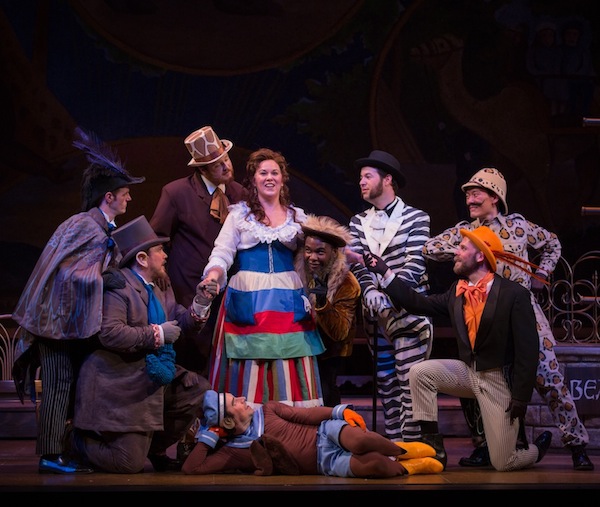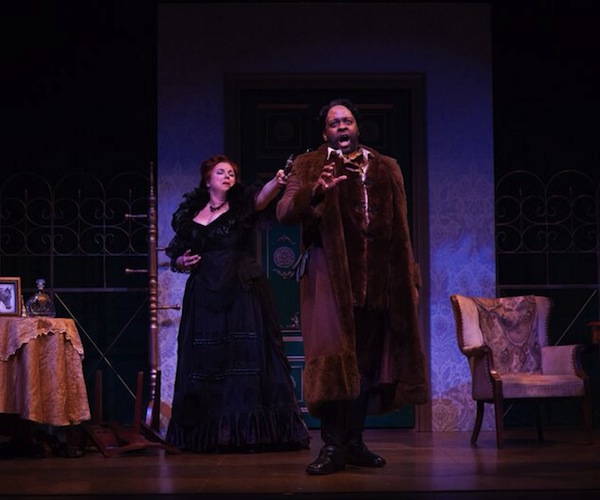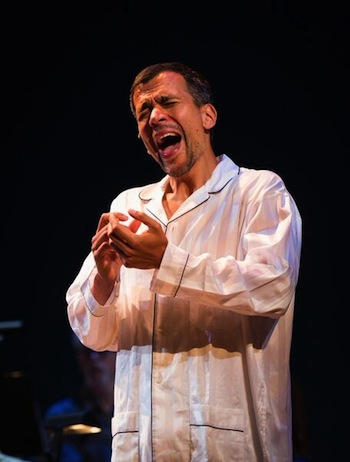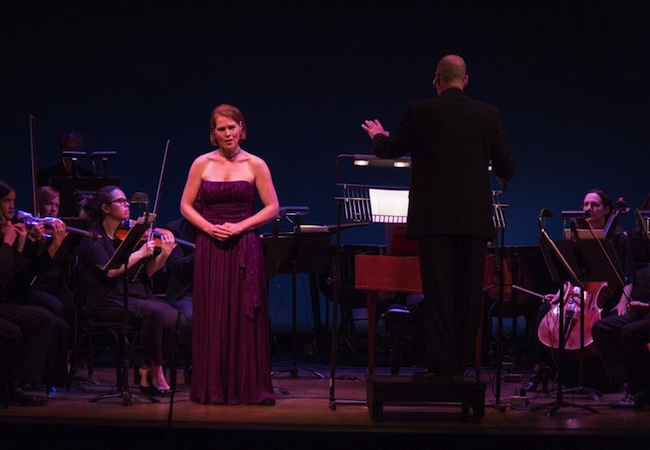Concert Reviews: The First Wave of Odyssey Opera’s “The British Invasion”
To say that Odyssey Opera continues to set the bar for opera performances in Boston may be a bit superfluous, but it’s true.
The British Invasion: A Festival of English Musical Dramas, staged by Odyssey Opera. Reviews of The Zoo, The Bear, and Kings, Queens, Saints, and Sinners: Five Monodramas. Still to come: Powder Her Face, at The Boston Conservatory, Boston, MA, June 18 through 20.

The cast of Odyssey Opera’s “The Bear.” Sadie Gregg is at the center. Photo: Kathy Wittman.
By Jonathan Blumhofer
For a city with a history of being a tough sell for opera, it’s perhaps appropriate that the second summer festival of its best opera company, Odyssey Opera, focuses on music from a country with a reputation for all but lacking a serious operatic heritage altogether. “The British Invasion,” Odyssey’s four-ish-week-long celebration of all things theatrical from England, looks to explode the latter myth; that it’s unfolding during some of the busiest weeks of operatic productions in recent memory in and around Boston suggests that the former might be, itself, well on the way to becoming history.
I caught two of Odyssey’s first three offerings a week apart: a double-bill of Arthur Sullivan’s The Zoo and William Walton’s The Bear, and a set of five monodramas for voice with (or, as it turned out, without) instrumental accompaniment. (I regrettably had to miss Odyssey’s highly praised production of Vaughan Williams’ Sir John in Love.) Both were admirably cast, acted, and sung. Best of all, there seemed to be a kind of missionary zeal that accompanied each performance. A few months ago, the blog “On an Overgrown Path” offered the proposition that audiences need “to be given permission to like unfamiliar music.” Well, that’s just what Odyssey’s done since its inception and the company continues the tradition in grand fashion with the “Invasion:” permission granted.
*****
Taken on its own merits, The Zoo is a charmer, though hearing it live made clear why it’s so little known. The libretto, by B. C. Stephenson (writing under the pseudonym “Bolton Rowe”), is often clever but lacks the rapier wit and emotional depth – not to mention the sheer, satiric inanity – of Sullivan’s best collaborations with William S. Gilbert. It’s not nearly as tight, in terms of story, as, for instance, Trial by Jury. And its Anglophilia, such a key element in the Gilbert & Sullivan canon, is here not quite as subtly integrated into the plot as it later would be.
The Zoo’s plot follows the travails of one Aesculapius Carboy, who is in love with Laetitia but has been denied her hand in marriage by her father, the retired grocer, Mr. Grinder. The two lovers have communicated through prescriptions (Carboy is a druggist) the latest of which Carboy is led to believe has been accidentally switched with one for Laetitia’s father. As The Zoo opens, Carboy, in despair, is about to hang himself from the refreshment stand run by Eliza, who herself is the object of one Thomas Brown’s affections. Carboy’s would-be suicide is interrupted by Eliza, who is soon visited by Thomas. The latter proceeds to gorge himself on sweets from the stand; he suffers a stomachache and, in the commotion, it is revealed that he’s actually the Duke of Islington in disguise looking for a wife. As the story unfolds, he proposes to Eliza, who only accepts his offer after it’s been revealed that he’s bought the zoo and all its inhabitants, and he pays off Mr. Grinder, allowing Carboy and Laetitia to wed (but not before Carboy, unaware of Islington’s activities, unsuccessfully attempts to feed himself to the zoo’s bears. Fortunately for him, they have been moved out of their pit due to renovations).
It’s all quite silly – if not outright preposterous – though all in good fun. Still, whatever enduring merits The Zoo has are a result of the music. Sullivan was nothing if not a fine, often inspired, tunesmith, and The Zoo brims with breezy, light-hearted melodies. There are, as there would be in The Pirates of Penzance and The Mikado, sly send-ups of operatic conventions of the day: the extended, melodramatic “Fare thee well” scene as Carboy climbs down into the bear pit being perhaps the best. And the score includes some lovely touches in the orchestration, like the tremolo strings doubling the voices in the quartet (really a double-duet, a la Rigoletto), “Once More the Face.”
In the leading roles Daniel Shirley made a strong impression as Carboy, singing with sweet, clarion tone. So, too, did Sadie Gregg, as Eliza. Chelsea Beatty was a bright, if tonally a bit thin, Laetitia and Colin Levin, while sturdy, sounded a bit boxed-in as the Duke of Islington. All four, though, strongly conveyed the situations of their particular characters. Conductor James Blachly drew a sprightly, colorful performance from the Odyssey Opera Orchestra, nicely drawing out the delicate touches in Sullivan’s orchestration (like the burbling clarinet in the opening chorus, “The British Public”), while maintaining a sure hand on the overall proceedings.

Janna Baty and Stephen Salter in Odyssey Opera’s staging of William Walton’s “The Bear.” Photo: Kathy Wittman.
If the Sullivan-Stephenson collaboration proved more diverting than substantive, there was at least one real revelation on Odyssey’s double-bill: William Walton’s 47-year-old “extravaganza” after Chekov. Walton wrote The Bear for Benjamin Britten’s Aldeburgh Festival, where it premiered in 1967 to critical and popular acclaim. Like much of Walton’s music, though, it’s fallen by the wayside over the ensuing years. Odyssey’s production made a powerful case for its reinstatement in the repertoire.
Written to a libretto Walton compiled with Paul Dehn (who, around the same time, was writing screenplays for films like Goldfinger and The Spy Who Came in From the Cold), The Bear relates the story of a widow, Popova, who has shut herself away after her husband’s death, dresses only in funeral clothes, and proceeds through the day wailing about her sad situation. No one, least of all her servant, Luka, seems to buy the act: he encourages her to leave the house and enjoy life once again, but she refuses. Eventually, Smirnov, one of her late husband’s creditors, arrives to claim a debt. The two bicker and fight, their confrontations leading (almost) to a duel. However, their burgeoning love for one another intervenes and the opera closes with Popova and Smirnov locked in an amorous embrace while Luka looks on, trying to make sense of what just happened.
For The Bear, Walton wrote a smart score: punchy, acerbic, and laced with wit. Not a note, it seems, is wasted. Stylistically, the music channels the spirit of Walton’s lighter style without becoming frothy – moments of it reminded me of a hung-over Façade, and the spirit of Brecht and Weill never seemed too far off. There are some allusions to other theatrical works – the opening bars, for instance, feature swooping string glissandos that allude to the beginning of Britten’s A Midsummer Night’s Dream before it’s revealed that they’re mimicking Popova’s melodramatic weeping, and snatches of the “Dance of the Seven Veils” turn up when Smirnov playfully encourages Popova to “unveil as did Salome” – but these are generally handled with subtlety.
In the role of Popova, Janna Baty was nothing short of superb. This is a role that demands a singing actress who can straddle the fine line between overplaying the character’s wild swings of mood and reducing the part to parody. Baty pulled it off: whether lamenting Popova’s widowhood through tears and laughter or listing her grievances against her late husband (in the snappy aria, “I was a constant, faithful wife”) or falling – by degrees – for Smirnov, she was wholly convincing. Hers was a tour-de-force performance, fully lived in, oftentimes brilliantly funny but totally sympathetic.
Though a trifle less manic, Stephen Salter’s Smirnov held his own with Baty’s Popova. This is another rather stock character, one it can be difficult to make come to life. Yet Salter, singing with a rich, powerful voice and wonderfully precise diction (in all of this he reminded me of the terrific Eric Owens), did just that; despite the inherent absurdity of the story, he and Baty had some fine chemistry between them. Simon Dyer, who I thought a bit stuffy as Mr. Grinder in The Zoo, was here a strong Luka, providing a robust and comic foil to the goings on around him in the dacha. And, in the pit, Gil Rose drew a vigorous account of the orchestral part.
Lynn Torgove directed both The Zoo and The Bear. The former was bright and colorful and featured the chorus dressed as the inhabitants of the place. For full ensemble numbers, especially, the staging was busy but never really felt cluttered. Torgove used the space well and kept everything moving, though some of the sight gags (a big lollipop representing the setting sun, for instance) struck me as a bit obvious and heavy-handed.
Laughs flowed more easily (and heartily) in The Bear, partly because the Walton/Dehn libretto isn’t nearly as dated as Stephenson’s, but also because the staging was more straightforward. In this, Torgove was nicely aided by Stephen Dobay’s simple set that evoked a large room in a stately Russian home.
*****
Forthright, unadorned stagings were also the name of the game in the second half of this past Saturday’s “Kings, Queens, Saints, and Sinners,” a program that, in reality, featured three monodramas plus a couple of orchestral songs. And, a few days after the event, it’s hard to pick which of the former stood out the most, so compelling were the performances of each.

Thomas Meglioranza gave a full-throated performance of “Eight Songs for a Mad King.” Photo: Kathy Wittman.
Maybe the most remarkable individual achievement belonged to Thomas Meglioranza, who bellowed, shrieked, wailed, and recited his way through Peter Maxwell Davies’ seminal Eight Songs for a Mad King. A vivid, often terrifying, theater piece depicting the insane King George III delivering a monologue to his pet birds (the musicians), Saturday’s account of it was also spiked with pathos: when, at the end of the fourth movement, Meglioranza (as George) offered “I am weary of this feint. I am alone,” the affect was heartbreaking more than anything else. As a result, it felt unsettling to enjoy the score’s lighter moments – among them, the distorted snatches of Messiah and the little foxtrot towards the end – though, perhaps, that’s the point. What Meglioranza’s full-throated performance did best was to humanize this, on these shores, much-maligned monarch. After all, behind the caricature and myth lived a disturbed, broken human being, and to be able to bring him to life as potently and compassionately as Meglioranza did is a significant artistic accomplishment.
In Eight Songs, the chamber ensemble is as integral to the dramatic action as is the singer (the King actually has extended dialogues with, respectively the flute, cello, clarinet, and violin in different movements of the piece). Davies’ kaleidoscopic score makes huge technical demands on everyone and covers a stylistic range that starts in the 18th century and ends in the farthest reaches of the 1960s avant-garde. Hats off, then, to the virtuoso work of flautist Sarah Brady, clarinetist Michael Norsworthy, keyboardist Linda Osborn, violinist Megumi Stohs Lewis, cellist Nicole Cariglia, and, especially, percussionist Craig McNutt, who, at the end of the piece, literally escorted the deranged King off the stage with a bass drum strapped to his shoulders.
Impressive as Meglioranza was, Elizabeth Keusch took the prize for singing an entire opera by herself. The opera in question was Judith Weir’s King Harald’s Saga, a ten-minute long, three-act retelling of the disastrous invasion of England in 1066 by the Norwegian King Harald. At the end, a sage provides an epilogue lamenting the pointlessness of war, thereby providing a neat bridge across nearly a millennium in all of about two minutes.
There are ten sung characters – plus a spoken narrator – two of whom (Harald’s wives) sing a duet with each other. Weir managed that particular scene deftly, with melodic lines that mirror each other in register and contour, and, for the rest of the piece, kept thing moving briskly and clearly. There are a handful of virtuosic passages, but most of the opera is lyrically declaimed, requiring a singer of great stamina, focus, and energy.
Keusch possessed all those qualities in droves. Whether depicting the warring Harald, the traitorous Tostig, the apparition of St. Olaf, or choruses of soldiers, she sang with bold tone and concentrated intensity. Gradually moving across the stage (Act 1 took place downstage right, Act 2 downstage center, and Act 3 downstage left), Keusch delineated her many characters through various poses and gestures.
The evening’s only really familiar score came at the end its first half, though it, too, isn’t exactly a frequent guest on programs: Benjamin Britten’s Phaedra. Erica Brookhyser, who made a strong impression in Odyssey’s Die tote Stadt last September, was nothing short of captivating here as the tragically conflicted wife of Theseus who (alas!) is in love with her stepson, Hippolytus. This short scene lasts only about fifteen minutes, but such is its intensity that it feels like one of the most substantial quarter-hours of opera this side of Brünnhilde’s Immolation Scene. Brookhyser brought a fiercely rich tone and measured vulnerability to the role, which is just what it calls for. In the end, hers was as emotionally searing a performance as they come. The strings and percussion of the Odyssey Opera Orchestra added subtle colors and support to the proceedings.

Erica Brookhyser was nothing short of captivating in Odyssey Opera’s staging of Benjamin Britten’s “Phaedra.” Photo: Kathy Wittman
Probably in part because of the absorbing quality of what came afterwards, the evening’s first two selections ultimately left less of an impression. Lennox Berkeley’s Four Poems of St. Teresa of Avila possessed moments of charm (especially in the second and fourth songs) and religious fervor (in the third). Stephanie Kacoyanis sang with warm tone and solid diction, but I came away wishing she had brought a bigger voice to the outer movements and less vibrato to the third (“Let mine eyes see Thee”).
The string orchestra overwhelmed countertenor Martin Near from time to time in Richard Rodney Bennett’s setting of Rimbaud’s Ophelia, though perhaps the voice being swallowed by and emerging from the orchestra (which represents the river Ophelia drowns in) was one of the goals of the piece. At any rate, Bennett’s score attempted to channel the hazy, chromatic idiom of Dutilleux. The piece lacked the French master’s sense of musical direction, though it did offer the opportunity to hear an ondes martenot (or, rather, a synthesized approximation of one). And some of its most striking moments involved that instrument: it’s subtle fusion with and out of the string textures and a striking cadenza for ondes and harp towards the end among them. But, for me, the whole piece lacked purpose and focus – the meandering river motif saturated its structure too thoroughly – and this performance, even benefiting from Near’s otherworldly pure tone and the precisely calibrated accompaniment of the orchestra, didn’t redeem it.
Still, the impression left by the monodrama evening as a whole was considerable. At its best, it demonstrated not just the enduring power of the genre but, particularly, the vitality of late-20th-century British musical theater.
*****
To say that Odyssey continues to set the bar for opera performances in Boston may be a bit superfluous, but it’s true. If nothing else, “The British Invasion” defines what a festival ought to be: thoughtfully planned, intellectually curious, and not afraid to push an envelope or two now and then. If only, I found myself wishing towards the middle of Saturday’s production, these type of commandingly executed performances of such invigorating, thought-provoking, off-the-beaten-path repertoire could be the programming rule for all Boston-area classical music institutions, not the exception to it. Ah, well. At least “The British Invasion” isn’t quite over: you can catch its finale, Thomas Adés’ Powder Her Face, between June 18th and 20th. Don’t miss it.
Jonathan Blumhofer is a composer and violist who has been active in the greater Boston area since 2004. His music has received numerous awards and been performed by various ensembles, including the American Composers Orchestra, Kiev Philharmonic, Camerata Chicago, Xanthos Ensemble, and Juventas New Music Group. Since receiving his doctorate from Boston University in 2010, Jon has taught at Clark University, Worcester Polytechnic Institute, and online for the University of Phoenix, in addition to writing music criticism for the Worcester Telegram & Gazette.
Tagged: Boston, Elizabeth Keusch, Erica Brookhyser, Gil-Rose, Lynn Torgove, Martin Near, Odyssey Opera, Sadie Gregg, Stephanie Kacoyanis, The Bear, The British Invasion, The Zoo
